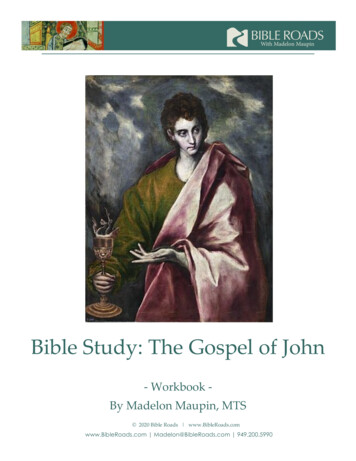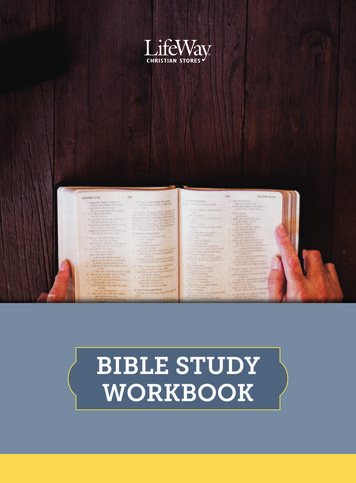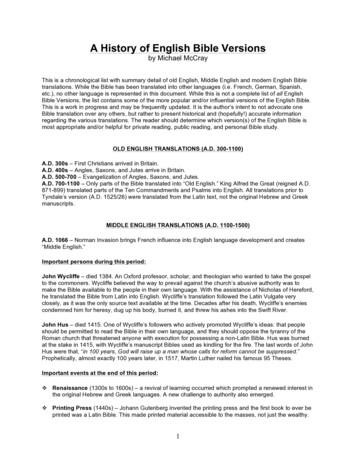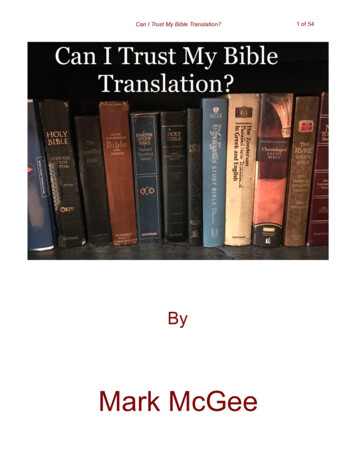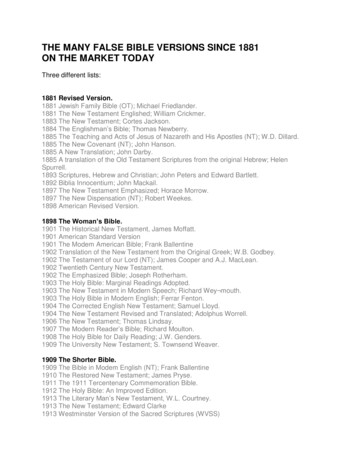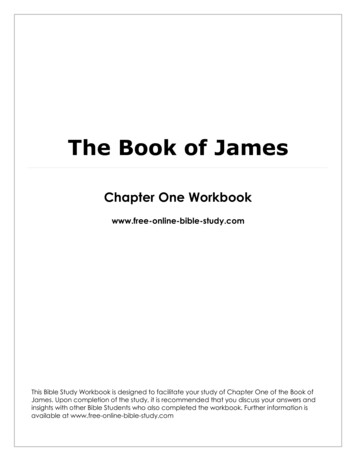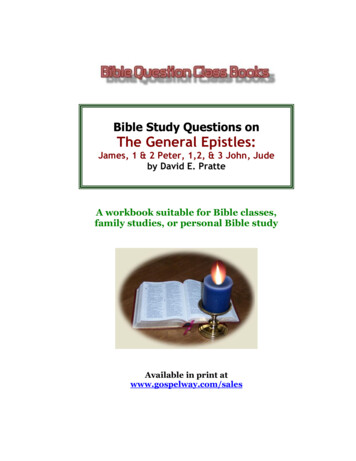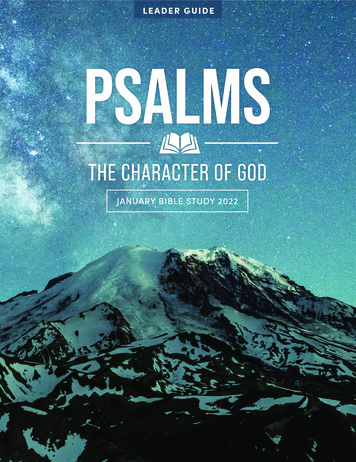
Transcription
LEADER GUIDEJANUARY BIBLE STUDY 2022
CONTENTSHOW TO BECOME A CHRISTIAN: LIFE BY DESIGN . . . . . . . . . . . . . . . . . . . . . . 2MEET THE WRITERS. . . . . . . . . . . . . . . . . . . . . . . . . . . . . . . . . . . . . . . . . . . . . . . . . . 2TEACHING PLANSSession 1: God Reveals His Character through His Son . . . . . . . . . . . . . . . . . . . . 4Session 2: Experiencing God’s Compassion and Forgiveness . . . . . . . . . . . . . . 7Session 3: God Can be Trusted Even in Dark Times . . . . . . . . . . . . . . . . . . . . . . . 9Session 4: God’s Goodness Can Be Seen in His Justice and Mercy . . . . . . . . . 12Session 5: God’s Presence Offered to All Who Turn to Him . . . . . . . . . . . . . . . . 14Session 6: God’s Character and Salvation Call for Our Praise . . . . . . . . . . . . . . 17Session 7: God Offers Hope to His People. . . . . . . . . . . . . . . . . . . . . . . . . . . . . . 20EXPOSITORY NOTESIntroduction to the Psalms . . . . . . . . . . . . . . . . . . . . . . . . . . . . . . . . . . . . . . . . . . . . . 24God Reveals His Character through His Son—Psalms 22–24 . . . . . . . . . . . . . . 28Experiencing God’s Compassion and Forgiveness—Psalms 32 & 51. . . . . . . . . 35God Can be Trusted Even in Dark Times—Psalms 42–43 . . . . . . . . . . . . . . . . . . 41God’s Goodness Can Be Seen in His Justice and Mercy—Psalms 73–83. . . . . 47God’s Presence Offered to All who Turn to Him—Psalms 84–88 . . . . . . . . . . . . 54God’s Character and Salvation Call for Our Praise—Psalms 113–118. . . . . . . . . .61God Offers Hope to His People—Psalms 120–134. . . . . . . . . . . . . . . . . . . . . . . . . 68PREACHING GUIDE. . . . . . . . . . . . . . . . . . . . . . . . . . . . . . . . . . . . . . . . . . . . . . . . . . 75
HOW TO BECOME A CHRISTIANLIFE BY DESIGNWe live in a broken world. This brokenness is seen in suffering,violence, poverty, pain, and death around us. Brokenness leads usto search for a way to make life work.The Bible tells us that God originally planned a world thatworked perfectly—where everything and everyone fit together inharmony. God made each of us with a purpose—to worship Himand walk with Him (Gen. 1:31 and Ps. 19:1).Life doesn’t work when we ignore God and His original designfor our lives. We selfishly insist on doing things our own way. TheBible calls this sin. Sin leads to a place of brokenness. The consequence of our sin is separation from God—in this life and for allof eternity (Rom. 3:23 and Rom. 6:23).We need a remedy—some good news. Because of His love,God did not leave us in our brokenness. Jesus, God in humanflesh, came to us and lived perfectly according to God’s design.Jesus came to rescue us—to do for us what we could not do forourselves. He took our sin and shame to the cross, paying thepenalty of our sin by His death. Jesus was then raised from thedead—to provide the only way for us to be rescued and restored toa relationship with God (John 3:16; Col. 2:14; and 1 Cor. 15:3-4).We cannot escape this brokenness on our own. We need to berescued. We must ask God to forgive us—turning from sin to trustin Jesus. This is what it means to repent and believe. Believing, wereceive new life through Jesus. God turns our lives in a new direction (Mark 1:15; Eph. 2:8-9; and Rom. 10:9).When God restores our relationship to Him, we begin todiscover meaning and purpose in a broken world. Now we canpursue God’s design in all areas of our lives. God’s Spirit empowersus to recover His design and assures us of His presence in this lifeand for all of eternity (Phil. 2:13 and Eph. 2:10).Now that you have heard this good news, God wants you torespond to Him. You can talk to Him using words like these: Mylife is broken—I recognize it’s because of my sin. I believe Christcame to live, die, and was raised from the dead—to rescue mefrom my sin. Forgive me. I turn from my selfish ways and put mytrust in You. I know that Jesus is Lord of all, and I will follow Him.MEET THE WRITERSDR. KON HWON YANG is a professor of Old Testament Studies at Gateway Seminary in Ontario, California. He began his service as theseminary’s dean of students in 1993. Upon completion of his degree, he was elected to a faculty position in 1997. He now teaches OldTestament, Hebrew and spiritual formation at the Los Angeles campus where his wife Patricia serves as Gateway’s digital services librarian.Professor Yang’s academic interest and specialties include Old Testament spirituality, wisdom literature, and spirituality of the Psalms. Hehas written and presented articles and papers on various Old Testament topics in both popular and scholarly venues.AMY SUMMERS wrote the suggested teaching plans for this study. Amy is a graduate of Baylor University and Southwestern BaptistTheological Seminary, has written for Lifeway Christian Resources for many years. Amy and her husband Stephen live in Belmont, NorthCarolina where they lead a small group of people who are committed to loving one another and serving Christ in community and whereshe leads a women’s Bible study. Parents of three young adults, Amy and Stephen are elated to recently become grandparents to twins.DR. MATT PEARSON wrote the preaching guide. Matt has served in pastoral ministry for over 20 years and currently serves as theCampus & Teaching Pastor at The Church at West Franklin. Originally from North Alabama, Matt graduated from Auburn University(1999) before receiving a Masters Degree (Expository Preaching) from the New Orleans Baptist Theological Seminary (2004) and a PhD(Preaching/Practical Theology) from the Mid-America Baptist Theological Seminary (2009). He loves spending time with his 3 children,Luke, Seth, and Birti, going on dates with his wife, Katie, drinking coffee, and watching Auburn football. 2021 Lifeway Press Printed in the United States of America ISBN: 978-1-0877-4161-1 Item: 005831440No part of this work may be reproduced or transmitted in any form or by any means, electronic or mechanical, including photocopying and recording, or by any information storageor retrieval system, except as may be expressly permitted in writing by the publisher. Requests for permission should be addressed in writing to: Lifeway Press, One Lifeway Plaza,Nashville, TN 37234.Subject Ares: Bible Studies / Dewey Decimal Classification Number: 223.2 / Subject Heading: Old Testament PsalmsLifeway Christian Resources One Lifeway Plaza Nashville, TN 37234Unless otherwise noted, all Scripture quotations are taken from the Christian Standard Bible , Copyright 2020 by Holman Bible Publishers. Used by permission.Christian Standard Bible and CSB are federally registered trademarks of Holman Bible Publishers.
TEACHINGPLANS
TEACHING PLANChapter 1 // Psalm 22, 23, 24YOUR NOTESGOD REVEALS HIS CHARACTERTHROUGH HIS SONBEFORE THE SESSION:a. Read the Introduction and Chapter1 of both the Personal Study Guide (PSG,pp. 4-22) and the Expository Notes in thisLeader Guide (LG, pp. 24-34).b. Make copies of Teaching Item1: Yesterday, Today, and Forever andTeaching Item 2: Jesus Is My Shepherd (ormake provisions to display that item).c. Have Personal Study Guides, extraBibles, and writing instruments available.d. Conduct an Internet search for“phrases that get lost in translation.”Compile a list of idioms in foreign languages(that don’t translate well into English).LEADING THE SESSION:1. Point out that idioms in one languageusually don’t translate well into otherlanguages. Brainstorm some Americanfigures of speech that get lost in translation.(Samples: Kick the bucket, between a rockand a hard place, jump on the bandwagon,quit cold turkey, raining cats and dogs.)Relay from your Internet search someidioms from other languages that just don’ttranslate into English.Declare it can be confusing, evenfrustrating, when something doesn’ttranslate. Relate from the Personal StudyGuide (p. 10) the illustration of Robertwho was “discouraged and frustrated with4TEACHING PLAN : Chapter 1 // Psalm 22, 23, 24the lack of vitality and relevance” in hisChristian life. His salvation experience wasgenuine, but that experience did not translate into living a victorious Christian life.Urge participants to take a moment toconduct a personal spiritual checkup usingDoes it Translate? (PSG, p. 13). Afterallowing them time to consider their spiritual condition, note that Christians mayrecognize their salvation is not translatinginto a vital, relevant Christian life. Say: Thatis not a reason for despair or discouragement, but for determination to gain adeeper understanding of our salvation sowe can live it out fully.Ask: What might many people think isthe purpose of being saved? Invite a volunteer to read Romans 8:29-30. Ask: Howmight those verses enhance our understanding of the purpose and experienceof salvation? Explain the salvation experience is not a one-time event in the past,but a full-life experience with past, present,and future implications. Emphasize thethree tenses of salvation (PSG, pp. 11-12).Assert the purpose of salvation is not justto gain forgiveness so we can eventually goto heaven, but to be restored to relationshipwith God so we can live in His presence andlive out His character in a fallen world.Invite a volunteer to read the paragraphin the Introduction to this study beginningwith “Many Christians lack an awarenessof the presence of God.” (PSG, p. 4). Pointout that Psalms is the most comprehensivesystematic theology one could read on thecharacter of God (PSG, p. 4). Assert: What
we will discover about the character ofGod can definitely translate to our lifeexperiences, because the better we knowGod’s character, the better we know God,and the better we know God, the more webecome like Him and demonstrate Hischaracter in the world.Distribute Teaching Item 1: Yesterday,Today, and Forever. State the three psalmswe will examine in this session, writtencenturies before Jesus walked this Earth,amazingly reflect the past, present, andfuture dimensions of our salvation. Wewon’t be engaging in an in-depth studyof each verse, but focusing on evidencesof God’s unchanging character that arerevealed through His Son. Recognizingand availing ourselves of those qualities cantranslate into victorious Christian lives.2. Note from the Expository Notes (LG,p. 28) that Psalm 22 doesn’t just teachus how to cry out to God honestly andfaithfully in our suffering, it reveals thecharacter of God through Christ’s sacrificeat Calvary. Invite volunteers to read aloudverses from Psalm 22 that make them thinkof Jesus’s crucifixion. Read aloud Psalm22:27-31. Guide the group to analyze howthose verses refer to Jesus’s sacrifice as well.Declare: What “he has done” (v. 31) in Hisdeath on the cross means that believershave been saved from the penalty of sin.Ask what the psalmist determined todo in Psalm 22:22. Explain proclaimingGod’s name means declaring His character.Ask: What character qualities of Godare revealed to you in this Psalm that soaccurately describes Jesus’s crucifixion?Encourage learners to record those qualities on Teaching Item 1: Yesterday, Today,and Forever. Use the Personal Study Guide(p. 14) to explain what God’s providenceis and emphasize how it is so evident inPsalm 22.Note that some may find it strange ortroubling to think of Jesus crying out Psalm22:1 from the cross. Ask: How might Jesus’scry actually been a declaration of faith inGod’s providence? Refer to A Closer Look(PSG, p. 21) as the group discusses thatquestion.Guide the group to consider how thisPsalm could have affirmed God’s providence to the disciples who witnessed Jesus’scrucifixion. Ask: How can Psalm 22 affirmGod’s providence to us in situations inwhich we might feel God has abandonedus? Declare it is vital to realize this psalmmoves from suffering to praise, which iswhat every believer can do because of ourpersonal relationship with God throughChrist.YOUR NOTES3. Say: Because Jesus, in God’s providence and mercy, laid down His life for uson the cross, He saved us from the penaltyof sin. But there’s more. We are beingsaved in the present from the power ofsin. That present aspect of our salvation isbeautifully expressed in Psalm 23. We canknow God better and experience His presence in a richer, fuller way as we see Hischaracter revealed through His Son as ourShepherd.Distribute or display Teaching Item 2:Jesus Is My Shepherd. Use that chart andthe Expository Notes (LG, p. 30) to presenta brief lecture comparing the shepherd inPsalm 23 to Jesus’s description of Himself asthe Good Shepherd in John 10.Invite volunteers to identify benefitsand provisions believers can enjoy becauseJesus is our Good Shepherd. Next, guidethe group to identify character qualities ofGod that are revealed in those benefits andChapter 1 // Psalm 22, 23, 24 : TEACHING PLAN5
YOUR NOTESprovisions. Encourage learners to recordthose divine qualities on Teaching Item 1:Yesterday, Today, and Forever.Ask: How are we to live in response toGod’s revelation of His character throughHis Son as our shepherd? Emphasize:We are not on our own to live out our salvation; our life is now the life of Christ, ourGood Shepherd within us (PSG, p. 18)and so we now live in submission to Him,allowing Him, as our shepherd, to guide,empower, nurture and provide for us.4. Briefly review that Psalm 22 revealsGod’s character through Jesus’s death thatsaved us from the penalty of sin, and Psalm23 reveals God’s character as Jesus ourshepherd is saving us from the power ofsin. Now we will see that Psalm 24 revealsGod’s character in the eternal reign of HisSon where we will be saved from the presence of sin.Lead a discussion with: What questionis the psalmist really asking in Psalm 24:3?(Sample answers: Who can go to heaven?Who can be in God’s presence for all eternity?) How does the psalmist answer hisquestion in verse 4? Is that good or badnews for us? Explain.Explain from the Expository Notes that:Climbing the mountain of the SovereignLord and standing in God’s holy place wasan act of privilege and blessing that onlyqualified ones were allowed to do (LG,p. 33). Ask: What might people mistakenly think qualifies them to go to heavenand be in God’s presence? What is the onlyway we can have clean hands and a pureheart? Affirm that we are not righteous or6TEACHING PLAN : Chapter 1 // Psalm 22, 23, 24pure in our own deeds, but are made pureand worthy of eternal life because the bloodof Christ has washed away our sins. It isin Him that we stand righteous before theFather.Declare: It is that truth that enables usto eagerly and confidently look forward toChrist’s return. Invite a volunteer to readthose Psalm 24:7-10. Use the ExpositoryNotes (LG, p. 34) and A Closer Look(PSG, p. 21) to explain those verses in theirhistorical context and make application tobelievers’ lives today.Ask participants what qualities of God’scharacter they see revealed in the returnand eternal reign of His Son. Encouragethem to record responses on TeachingItem 1: Yesterday, Today, and Forever.Invite someone to read the last paragraph in the PSG beginning with: The factis the Son of God paid the penalty of oursins (p. 18). Request learners completeA Triumphant Translation (PSG, p. 20).Invite one or two volunteers to share theirdescriptions. Assert if we don’t feel thedescriptions that we recorded apply to us,we must remind ourselves of the characterof God that can transform us. Encouragelearners to review God’s character qualities they recorded on Teaching Item 1:Yesterday, Today, and Forever. Ask: Howcould recognizing and trusting in thesequalities translate into a more victorious,vibrant Christian life?Close in prayer, thanking God forrevealing Himself and saving us throughHis Son, and asking that He empowerlearners to live out the fullness of theirsalvation experience.
TEACHING PLANChapter 2 // Psalm 32 and 51EXPERIENCE GOD’S COMPASSIONAND FORGIVENESSBEFORE THE SESSION:a. Read Chapter 2 in the Personal StudyGuide (PSG, pp. 23-34) and the ExpositoryNotes in this Leader Guide (LG, pp. 35-40).b. Make copies of Teaching Item 3:Psalms of Repentance and Restorationand Teaching Item 4: What Can WashAway My Sin?c. Have Personal Study Guides, Bibles,and writing instruments available.LEADING THE SESSION:1. Remark that, in the last session, thegroup considered things that are difficult totranslate; today you want to consider thingsthat are difficult to explain. Invite one or twovolunteers to explain, with words only, how toskip. Then request learners rate on a scale of1 to 10 (10 being most difficult) how difficultit would be for them to explain to someonehow to cast a show from a streaming appfrom a smartphone to a television. State:Some things are just hard to explain.Relate the PSG illustration of the wellrespected Christian leader convicted of fraudand read the question: How do we explainsin—blatant, obvious sin—in those whonot only know Christ, but are devoted toserving Him? (PSG, p. 23-24). Ask: Why isit important to at least try to explain howgodly people fail? Point out we need to beable to understand the anatomy of sin andour vulnerability to it.YOUR NOTESAssert: It’s also important to be ableto explain how we can experience God’sforgiveness and compassion when we dosin. David was a devoted follower of God,yet he sinned in dramatic, devastating ways.Briefly detail David’s sins. Two Psalms Davidwrote after his epic failure provide a modelfor us to follow when we sin, and they showus that God’s character is revealed in theconviction, confession, and cleansing of sin.Distribute Teaching Item 3: Psalms ofRestoration and Repentance.2. Stress David’s conviction was due tohis relationship with God. Designate halfthe group Team A and the other half TeamB. Instruct Team A to read Psalm 32 onTeaching Item 3: Psalms of Restorationand Repentance and underline indicationsDavid was under conviction, and Team Bdo the same with Psalm 51. Invite volunteers to read what they underlined. ExplainDavid used figurative expressions like “Mybones became brittle” (Ps. 32:3), to conveythe emotional and physical condition ofsuffering under unconfessed sin. David wasnot just convicted of his specific sin, but ofhis sin nature. Use the Expository Notes(LG, p. 38) to speak on Psalm 51:5.Ask: How was David’s pain an indication of God’s mercy? Then Read 2Corinthians 7:10. Guide the group tocontrast condemnation and conviction.Note that condemnation is from Satanand burdens people with guilt, so we livein slavery to regret, failure, and hopelessness. Conviction is from God. It revealsChapter 2 // Psalm 32 and 51 : TEACHING PLAN7
YOUR NOTESHis character of holiness, justice, andcompassion, and is intended to restore usto fellowship.3. State sometimes we may feel moreselfish sorrow over what sin has done tous rather than godly sorrow over what oursin has done to God’s reputation and ourrelationship with Him. God wants us tomove past selfish sorrow, so He allows usto suffer the consequences until convictioncompels us to come to Him in repentanceand confession (PSG, p. 28).Instruct learners to circle on TeachingItem 3: Psalms of Repentance andRestoration every occurrence of the word“my” in Psalm 32:5 and Psalm 51:2-3. Ask:What was David doing with these statements? (taking ownership of what he’ddone). Use the Expository Notes (LG, p. 35)to explain the three terms David used todetail the nature of sin.Invite a volunteer to read Psalm 51:4.Evaluate how David could make thatstatement when he’d obviously sinnedagainst so many people. Emphasize: Sincan destroy one’s life, one’s family, andone’s God-called ministry, but we cannotcomprehend how severely it grieves Godand crushes His heart.Request learners consult Psalm 32:5 andstate how David responded to God’s conviction. Explain the meaning of confess (PSG,p. 29). State: Sometimes when we talk toGod about our sin, we say things like, “I’msorry God, but he but she but You.”True confession has no “buts” or excuses.We agree with God that it is sin.Explain Psalm 32 is a didactic psalm(intended to teach and give moralinstruction) that urges readers to chooseconfession over cover-ups. Direct attentionto Psalm 32:9-10 and ask: How does Daviddescribe a person who won’t confess at all,8TEACHING PLAN : Chapter 2 // Psalm 32 and 51or who confesses with excuses? Why doeshe tell us not to be like this? Note Davidused stubborn animals to urge God’s peopleto be quick to submit and surrender to theLord (LG, p. 36). That requires confessionand repentance.4. Instruct learners to draw a heartaround Psalm 51:10-12 on Teaching Item3: Psalms of Restoration and RepentanceAsk: What was the heart of the matter forDavid? To gain a clean heart, David pled forforgiveness. Read Psalm 51:1-2,7. Requestlearners identify God’s character qualitiesDavid appealed to for forgiveness. Read1 John 1:9. Use the PSG (p. 31) to emphasize the implications of the word “all” in thatverse. Distribute Teaching Item 4: WhatCan Wash Away My Sin? to highlight themessianic overtones in David’s prayer forforgiveness. All David could do, all we cando, was confess and ask for forgiveness witha broken, humble heart and God responded.Instruct Team A to bracket in Psalm32 verses that describe the results of beingforgiven and cleansed by God. InstructTeam B to do the same with Psalm 51. Invitevolunteers to summarize the verses theybracketed in two or three words.Recall that some things are hard toexplain, but experiencing God’s forgivenessis something that we can, and must, explainhow to do. Discuss Keys to Cleansing (PSG,p. 30) as a means to review what Psalms 32and 51 reveal about conviction, confession, and cleansing. Add to the discussionwith the Expository Notes discussion on thethree keys to experiencing God’s forgiveness(LG, p. 40).Encourage adults to underline theparagraph that begins, “So in conclusion,conviction and confession” (PSG, p. 32)”Close in prayer.
TEACHING PLANChapter 3 // Psalm 42 and 43YOUR NOTESGOD CAN BE TRUSTEDEVEN IN DARK TIMESBEFORE THE SESSION:a. Read Chapter 3 in both the PersonalStudy Guide (PSG, pp. 35-46) and theExpository Notes in this Leader Guide (LG,pp. 41-46).b. Make copies of Teaching Item 5: AGuide in the Dark. Prepare to display,or make copies of, Teaching Item 6: TheDistance Between Mountains.c. Have Personal Study Guides, extraBibles, and writing instruments available.d. Have a water bottle or glass of icewater on hand.LEADING THE SESSION:Ask adults if they, or their children, wereafraid of the dark when they were young.Ask: What were reasons for that fear? Whatdid you do to help dispel that fear? Ask: Whatare questions people ask, or conclusionsthey make, about God in dark times? Usethe PSG (pp. 35-36) to elaborate on questionsand conclusions people make about God intimes of tragedy.Urge volunteers to recall from the first twochapters of this study some character qualitiesof God that were revealed in the Psalms thegroup examined. Ask if adults agree with thePSG (p. 36) that: It is easy to lose perspectiveon the nature and character of God when weare going through the darkness of adversityand times of suffering, and if so, why.Say: We may have all at some pointasked, Where is God when it is dark?This study examines two psalms of lamentin which the psalmist honestly admits tobeing in the dark night of the soul and hequestioned where God was. Use the PSG(p. 36) and Expository Notes (p. 41) toexplain why many believe Psalms 42 and43 may have originally been one psalm. Aswe examine these psalms as one, we canfollow the psalmist’s journey of faith as heexpresses his complaint, but also expresseshis confidence that God can be trusted,even in dark times.2. Distribute Teaching Item 5: A Guidein the Dark to use as a guide for this study.Draw attention to the first question andrequest learners write their responses inthe space provided on Teaching Item 5:A Guide in the Dark as you read aloudPsalms 42 and 43. Invite volunteers to sharetheir responses. Use the Expository Notesunder Acknowledging the Presence ofProblems (LG, p. 44) to address the issue ofdoubt and depression in Christians.Invite responses to the second questionon Teaching Item 5: A Guide in the Dark.Encourage learners to record responseson their guide in the space provided.State that besides feeling troubled andtaunted by deceitful and unjust people,the psalmist was depressed because hefelt so far from God. Display or distributecopies of Teaching Item 6: The DistanceBetween Mountains. Point out the locations of Jerusalem, where the house of GodChapter 3 // Psalm 42 and 43 : TEACHING PLAN9
YOUR NOTES10represented His presence to the people, Mt.Hermon, and the Jordan River. Explain thepsalmist longed to be with God on Hisholy mountain in Jerusalem (Ps. 43:3).It’s possible the psalmist was physicallyaway from God’s house and presence andwas in the mountains of northern Israel, atMt. Hermon from which the Jordan Riverflows. Regardless, he was feeling reallydistant from God.Determine reasons Christians feel farfrom God. Point out that sometimes ourown choices distance us from God (see PSG,p. 39 – second paragraph under Confidencein God’s Faithfulness), but sometimes Godallows us to go through dark times with noawareness of His presence in order to drawus even closer to Him.Discuss question 3 on Teaching Item 5:A Guide in the Dark, once again encouraging learners to record answers in thespace provided. Note that what the psalmistmost desperately desired, beyond God’svindication and rescue, was God Himself.Invite a volunteer to read Psalm 42:1-2.Then display the water bottle or glass ofice water. Instruct learners to think abouttimes they have been extremely thirsty. Ask:How do you feel when you’re extremelythirsty? Why are you grateful to feel thediscomfort of thirst? Just as physical thirstis a gift that prompts us to drink life-givingwater, dark times are a gift that prompt usto seek the life-giving presence of God.Guide the group to determine ways weseek God’s presence. Ask rhetorically: Butwhat about times when we do pray andread our Bibles and worship with God’speople and yet we still feel a sense ofseparation from God? If you have everexperienced that reality, you perhaps canidentify with the psalmist’s emotionaldejection and turmoil. Relate the differingTEACHING PLAN : Chapter 3 // Psalm 42 and 43interpretations of Psalm 42:6-7 from thePSG (p. 38) and the Expository Notes (LG,p. 42). Regardless of whether the psalmistwas using the billows of winds and wavesto illustrate his troubles or God’s presence,the ultimate truth was that they madehim aware of God’s faithful love. Use theExpository Notes (p. 42) to speak brieflyon hesed (God’s faithful love). State: Thequestion for us is whether we are going toallow ourselves to be overwhelmed by ourdark times or by God’s faithful love.3. Ask: How do you feel about thepsalmist’s honesty in expressing hisemotions and complaints? What arereasons you feel that way? EmphasizeGod is not offended when His people talkhonestly to Him both in pain and in praise(LG, p. 45).Explain psalms of lament expresscomplaints, but usually express confidence as well. Ask: How can complaintsto the Lord actually reflect a faith that isconfident in God’s faithfulness? Discussquestion 4 on Teaching Item 5: A Guidein the Dark, encouraging learners torecord responses on their guide. Notethat, just as David’s relationship with Godprompted him to experience convictionand cleansing of sin in Psalms 32 and51 (examined in the last chapter), thispsalmist finds confidence in his relationship with God as well. Request learnersindicate what the psalmist called God inPsalms 42:5, 8-9, 11, and 43:2, 4-5.State when we mistakenly assume thatbeing a Christian exempts us from suffering,we can be blindsided when adversity comesand suffer doubt and dejection. Dark timescompel us to consider what is really god ofour lives. Discuss The God of My Life (PSG,p. 39). Say: When dark times reveal what is
really god in our lives, we must acknowledge our self-sufficiency is a sham and thatour only real hope is the living God.State the psalmist repeated the refrain ofhis dual reality of adversity along with hopein God’s faithfulness in Psalms 42:5, 11, and43:5 because each experience of trials andanxiety served to bring the psalmist back toGod as the source of hope (PSG, p. 40). Likethe psalmist, we must allow God to intervene in order to control our attitudes andemotions and give us hope (PSG, p. 40).Guide the group to contrast the world’sdefinition of hope with the biblical implication of the word “hope” (PSG, p. 40).Emphasize worldly hope is based on wishesfor what might happen; biblical hope is afuture certainty based on God’s character.4. Direct attention to Psalm 43:4-5.Ask the fifth question on Teaching Item 5:A Guide in the Dark, once again encouraging adults to write responses in thespace provided. Note from the PSG (p.44) that trusting and praising God in darktimes is no more confidently expressedthan in the short Old Testament Book ofHabakkuk. Explain the prophet Habakkuklived in dark times. Within the nation ofJudah there was violence, injustice, strife,and oppression, while outside the nationloomed the even more violent and wickedBabylonians, ready to swoop in and wipethem out. Yet Habakkuk chose to live byfaith in God’s character and His promises,and that determination compelled him topraise God in the dark. Invite someone toread Habakkuk 3:17-19 from Praising Godin the Dark (PSG, p. 43). Encourage adultsto use that activity to write their own hymnof praise.Ask: How can praising God in the darkgive us victory over despair? Point outfrom the PSG that praising God remindsus that hope and victory are not in our ownstrength, even in our capacity to fortify ourfaith, bu
Christian life. His salvation experience was genuine, but that experience did not trans-late into living a victorious Christian life. Urge participants to take a moment to conduct a personal spiritual checkup using Does it Translate? (PSG, p. 13). After allowing them time to cons



